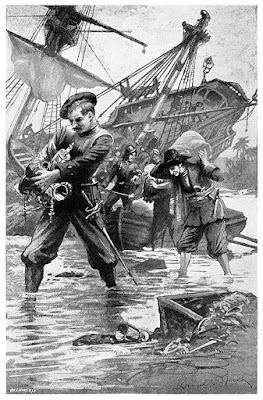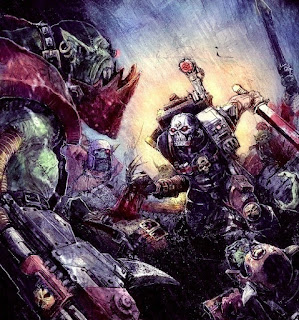 |
| Art credit: solstng |
“Why don’t you just put the whole WORLD in a BOTTLE, Superman?” - Lex Luther, Superman: Red Son
No one wants to die. Spellcasters have managed to discover various means of rendering themselves immortal, known by ominous names such as Dreamers, Body Thieves, Conduits, Unmade, Beholders, or Fateless. By hook or crook these folk manage to duck the reaper’s scythe. The majority of these aspirants towards immortality fall along the way, but some persist and reach that elusive peak. Abjurers are the only ones who can reliably claim to do so for altruistic reasons. It is not enough to save them from madness.
Who wouldn’t want to safeguard their loved ones? The allure of Abjuration is in many ways a more beneficent one than what most Magic-Users fall prey to. The school contains no grand invocations to rend one’s foes apart, spells to ensnare minds, or bend souls to their wills. While capable of attacks due to their limited capacity to learn spells from other schools, most Abjurers trust in their abilities to counter or outlast their opponents. Lionized by those they protect, Abjurers can often proudly wear the titles of Wardens or Stewards. Given they can act as one of the only reliable means of shielding others against harmful magic, most stewards quickly become indispensable to those in their charge, and are given nearly anything to keep them contented.
It is a sad fact that nearly every Abjuration spell is written in the blood of someone who a warden failed to protect. While some are cynical, hardened, or fatalistic enough to accept these losses, others become haunted by them. These wardens often become paranoid, even controlling, as they search for possible threats against those they are safeguarding. This urge becomes overwhelming as the impossibility of their task begins clear. A steward, no matter how powerful, cannot be everywhere, and they are not omniscient. Many begin to claw desperately for solutions, such as the ways of the Cleric, but either through lack of devotion or zeal, that path fails to show them the right solutions. For this select group of wardens, the answer soon becomes clear: they must seal who they wish to protect away from the world. They have to craft a place that cannot be breached. They must become Keepers.
“Time is dead and meaning has no meaning!” - Bill Cipher, Gravity Falls
Abjuration is not usually the most common choice for specialist wizards. It lacks the raw destructive power of evocation, the edginess of necromancy, or the sheer utility of the illusion or transmutation schools. While relatively unsung in D&D, spells resembling abjuration magic are some of the most common in fiction and mythology. Counterspells, protective wards, the exorcising of spirits or demons, all fall within the purview of abjuration. The measures Keepers must take are on another level entirely.
Bill Cipher is the overarching villain to Gravity Falls. A malevolent entity from the 2nd dimension, Bill had torn his way into the 3rd dimension a little over a thousand years before the events of the series, only to be sealed away by a group of Native American shaman. This was the status quo until Ford Pines released Bill first into his mindscape, and then eventually tried to bring the entity into reality itself. The ritual went terribly wrong, and Ford was lost to the world for three decades. Ford’s nephew Dipper finds one of his Great Uncle’s journals, and through the course of the series Dipper becomes a pawn and dupe for Cipher. This culminates with Bill breaking free into the real world. While pursuing Dipper and his sister Mabel, Cipher banishes Mabel into a Prison Bubble so he can torture Dipper in private. To our reckoning, it is as if Mabel has simply been magically snapped out of existence.
The world inside the bubble is made explicitly to ensnare Mabel within perfection. Every whim she has is fulfilled instantly and her reality becomes a penitentiary with bars she crafted for herself. Mabel sees no reason to leave, even when her friends come to rescue her and make it clear how dire the situation outside the prison is. With everything she needs and wants, she can argue convincingly there’s no real reason for her to leave. So what if the situation outside is awful? Mabel can wish up ice cream just by thinking about it! Most of Mabel’s friends also quickly fall prey to the place, since the prison bubble adapts itself to their needs, ensnaring everyone but Dipper. His attempts to try and convince his twin that the prison is evil are stymied in real time by the appearance of a supportive doppelganger of himself to argue against him. Escaping is initially like trying to fight a friendly genie.
All the sunshine, rainbows and safety disappears when the crew tries to escape their self-gilded cage. The imaginary residents of the bubble become hostile, aggressive, and actively terrifying. The inhabitants begin to hunt Mabel and her friends, eventually capturing them and putting them on trial. While they eventually break free, the message is clear: the bubble is only a place of joy as long as no one ever tries to rock the boat.
“Magic does that. It wastes you away. Once it grips you by the ear, the real world gets quieter and quieter, until you can hardly hear it at all.” - Catherynne M. Valente, Deathless
Of the immortals, keepers are the most likely to continue interacting with the world at large. Unlike other archmages, keepers generally maintain the high esteem they are held in by others, at least at first. The keeper’s charges vanish from the world, sometimes all at once, sometimes one by one as their “protector” spirits them off to their Domain. Many of these magi will go to extraordinary lengths to conceal these actions from others, often caving to their own paranoid imaginings to ensure the safety of those under their wards. A side effect of this is to conceal the keeper’s growing madness from their colleagues or foes, and often the first sign of something amiss is when the formerly sedate warden lashes out in a bout of arcane violence. The immortal’s erratic behavior then grows into systematic attacks upon anything they believe may act as a feasible threat to them in the future, and once they’ve accomplished their goal of neutering the opposition they retreat into the Domain they’ve been crafting this entire time.
As they tread the road down into tyranny, particular spells in the Warden’s repertoire begin to act as signposts along the way; Pass Without Trace, Mordenkainen’s Private Sanctum, Globe of Invulnerability, and Imprisonment. All are bent to their limits, and through repeatedly casting these particular spells on themselves and on a discrete area, they begin to permanently alter the connection the place has within the world. This starts off as a form of occultation and immunity from dimensional travel inside the locale, known most commonly as a Domain. Drawing upon decades of experience in their art, the Keeper then encodes mighty wards of obfuscation, binding and protection within the land itself, slowly pushing the boundaries outwards as their insight grows.
Domains are essentially immune from outside incursions. They cannot be detected through the use of natural senses or magic, and even if one were to somehow find the place, it would be nearly impossible to enter or exit without the Keeper’s consent. Domains are really only limited by how much land a given keeper needs for their purposes. Some may only be a few miles across, while the largest can encompass a city-state. The residents of a domain are inmates as much as they are in it’s protection. While they are safe from the ravages of time and threats from the outside world, they are at the effective mercy of their keeper. Many keepers begin to see their charges as ingrates or lacking the maturity to understand why their guardian’s actions were necessary. Descending into loathing and resentment, most keepers eventually come to wonder why these people were so important to them in the first place.
Game Information
The myriad spells of protection a keeper has encoded within their soul protects them from both age and any form of natural death or disease. Keepers also gain resistance to non-magical damage as long as they are aware the possibility of an attack exists.
Through their prodigious command of Abjuration, Keepers can directly sacrifice prepared spell slots to prevent incoming damage to themselves or others. After witnessing a successful attack, and after damage has been calculated, the magus may spend a spell slot to negate the incoming damage as reflected on the table below. A magus may use this ability at any time, but may only do so as many times a round equal to their Wisdom Bonus (minimum 1).
Spell Level
Damage Prevented
1
2d10
2
3d10
3
4d10
4
6d10
5
8d10
6
10d10
7
12d10
8
14d10
9
16d10
In addition to their ability to directly reduce damage by spending spell slots, a keeper may attempt to counter any spell they can currently observe being cast by spending a spell slot of the spell’s level or greater. The caster of the spell must then succeed on a Concentration check or save vs. Magic (as appropriate to the system) or the spell fails. A keeper may use this ability at any time, but may only do so as many times a round equal to their Wisdom Bonus (minimum 1).
Within their Domain, a keeper is able to control the flow of magic within the space to a fine enough to degree they are able to disrupt any spells which displease them. While inside the domain, spells from hostile sources can only be cast after a successful save vs Magic or Concentration check. This ability stacks with the Keeper’s ability to disrupt spells by sacrificing spell slots. Keepers are Immune to non-magical damage within their place of power. While time does pass within a Domain, anyone living within it does not age, nor can they be killed by non-magical disease. Divination magic cannot locate a Domain, and effects such as Summon Monster or Teleport automatically fail within their boundaries.
Thanks for reading folks! I have only one entry left in this series, after I am finished I'm intending to show off a few new OSE classes I have been working on.
All art is the property of it's respective owners, and will be taken down at their request.























